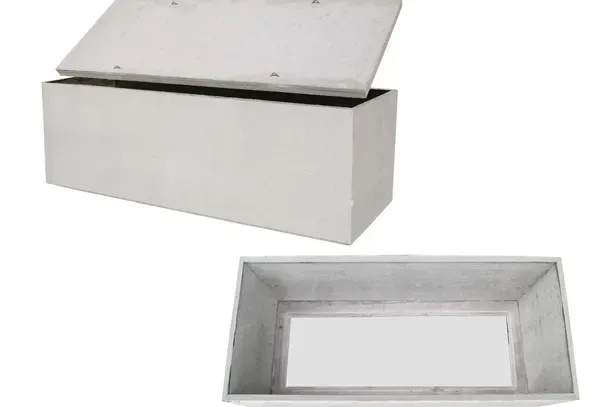Outer Burial Container
Few cemeteries allow for a complete natural burial - without needing a vault or outer burial container. Most cemeteries require a minimal "Green Grave Box". This is an outer burial container that does not have a bottom, allowing a natural casket to be placed directly onto the Earth.

Green Burials and Outer Burial Containers: An Environmental Perspective
When it comes to end-of-life options, the choices we make can significantly impact the environment. In this context, outer burial containers, such as burial vaults and grave liners, play a meaningful role. We’ll dive deep into what these items are, their environmental implications, and the green burial options available.
What Are Outer Burial Containers?
An outer burial container is a structure usually made from concrete, high-impact plastic, and/or metal, designed to encase a casket once it's buried in the ground. The purpose of this container is to maintain the integrity of the burial plot, preventing it from collapsing due to the disintegration of the casket and body over time, thus facilitating cemetery maintenance.
If you’ve ever seen an old cemetery in New England or Europe and noticed tilted and fallen-over headstones, it’s because caskets degrade with prolonged exposure to the natural elements in the earth causing the casket buried in the ground to eventually collapse.
This creates a large divot in the land on the surface making groundskeeping for traditional cemeteries more difficult and putting stone grave markers at risk.
So the cemeteries’ solution is to require a sturdy vault or grave liner be placed into the gravesite before the body and casket, then covering the outer burial container with a matching rigid cover before filling the grave.
There are two primary types of outer burial containers: burial vaults and grave liners
Burial Vaults and Grave Liners
A burial vault is a heavy-duty container typically made from molded concrete, lined with high-impact plastic or metal for additional strength and water-resistance. It's designed to withstand the weight of the earth and grave maintenance equipment, protecting the casket from the elements.
A grave liner, on the other hand, is a lighter and less expensive replacement for a burial vault. It is usually made of unpolished concrete and serves the same purpose of maintaining the cemetery grounds, but is not water resistant and does not keep elements from the casket. A grave liner can also be referred to as an outer burial container or grave box.
According to green burial laws in Minnesota, a vault or grave liner is not legally required, but are routinely used to meet the requirements of the individual cemetery. While they ensure the cemetery's aesthetics and ease of maintenance, these containers have significant environmental implications.
Environmental Impact of Outer Burial Containers
The materials used to construct burial containers and the processes to manufacture them contribute to pollution and resource depletion. Good quality vaults typically weigh between 2000 - 3400 pounds and require significant fuel to transport.
Additionally, the non-biodegradable nature of most containers means they will remain in the ground indefinitely, inhibiting natural decomposition and possibly leaching chemicals into the surrounding earth.
Green Burial Options
Thankfully, more eco-friendly alternatives are emerging, such as green burials. Green burials focus on minimizing environmental impact by using biodegradable green burial caskets or shrouds, avoiding embalming fluids, and foregoing outer burial containers altogether.
Green burial cemeteries or hybrid cemeteries allow burial without any vault or outer burial container. Established local cemeteries that allow burial without an outer burial container are Roselawn Cemetery in Roseville, MN; Mound Cemetery of Brooklyn Center; and Resurrection Cemetery in Mendota Heights, MN.
At these hybrid or natural burial cemeteries, traditional practices like using a large rigid casket or outer burial container can be forgone to allow the body to return to the earth organically.
Green Burial Using an Outer Burial Container
If the cemetery you want to use, or already own a plot at, requires an outer burial container you can still have a version of a green burial. At Interra we call this type of service Interra Eco.
Burial takes place at a hybrid cemetery which means it likely has traditional landscaping, accommodates traditional burial, and requires an outer burial container. What we are generally able to do is to place the unembalmed body in a biodegradable shroud or all natural casket and place that directly onto the earth inside the grave. We then place a thin, five-sided concrete grave liner, open-side down, over and around the body. This maintains the structure of the grave but allows water, earth and microorganisms to contact the body from underneath the natural carrier or casket.
Green Burial Caskets and Natural Burial MN
A green burial casket is typically made from sustainable, untreated, biodegradable materials such as bamboo, willow, or pine. When used without a casket outer burial container, it allows the body and casket to decompose naturally and return its nutrients to the earth, fulfilling the natural life-death-life cycle.
Green Burial and Cremated Remains
Even for cremated remains, green burial options are available. Instead of non-degradable urns, the remains can be placed in a biodegradable urn or directly interred into the earth, reducing the environmental impact. This also depends on the policy of the specific cemetery.
Final Thoughts
While outer burial containers have their place in maintaining cemetery grounds, the growing trend toward green burials reveals a promising shift in our approach to death care. By choosing options like green burial caskets and forgoing the use of a rigid casket, vault or outer burial container, we can significantly reduce our environmental footprint, even in death. In regions like Minnesota, where green burials are gaining traction, we see an encouraging example of sustainable practices becoming normalized and hopefully spreading beyond its borders.
As we continue to become more environmentally conscious, exploring these
green burial options represents a profound way to respect and preserve our planet.



